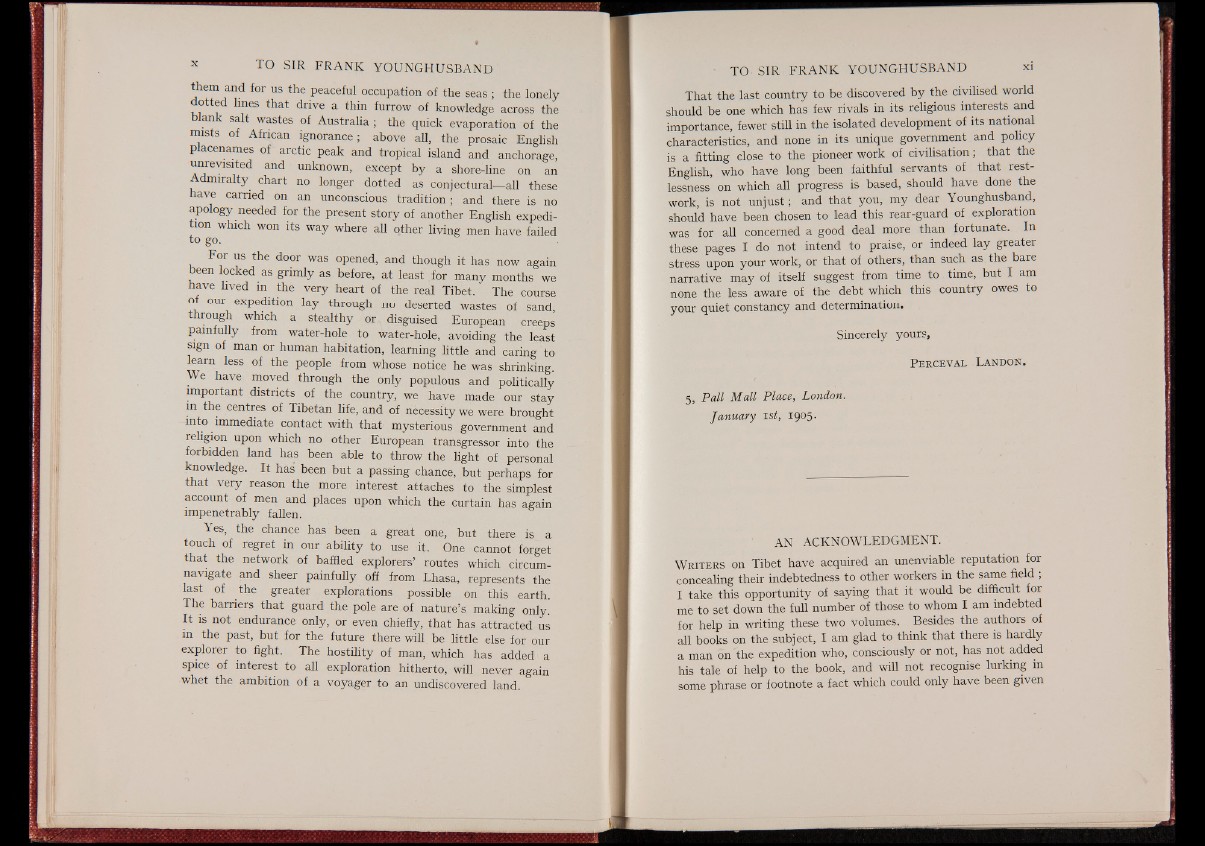
them and for us the peaceful occupation of the seas ; the lonely
dotted lines that drive a thin furrow of knowledge across the
an salt wastes of Australia ; the quick evaporation of the
mists of African ignorance; above all, the prosaic English
placenames of arctic peak and tropical island and anchorage,
unrevisited and unknown, except by a shore-line on an
Admiralty chart no longer dotted as conjectural— all these
have carried on an unconscious tradition; and there is no
apology needed for the present story of another English expedition
which won its way where ah other living men have failed
to go.
For us the door was opened, and though it has now again
been locked as grimly as before, at least for many months we
have lived m the very heart of the real Tibet. The course
of our expedition lay through no deserted wastes of sand,
through which a stealthy or disguised European creeps
painfully from water-hole to water-hole, avoiding the least
sign of man or human habitation, learning little and caring to
learn less of the people from whose notice he was shrinking.
We have moved through the only populous and politically
important districts of the country, we have made our stay
in the centres of Tibetan life, and of necessity we were brought
into immediate contact with that mysterious government and
religion upon which no other European transgressor into the
forbidden land has been able to throw the light of personal
knowledge. It has been but a passing chance, but perhaps for
that very reason the more interest attaches to the simplest
account of men and places upon which the curtain has again
impenetrably fallen.
le s , the chance has been a great one, but there is a
touch of regret in our ability to use it. One cannot forget
that the network of baffled explorers’ routes which circumnavigate
and sheer painfully off from Lhasa, represents the
last of the greater explorations possible on this earth.
The barriers that guard the pole are of nature’s making only.
It is not endurance only, or even chiefly, that has attracted us
m the past, but for the future there will be little else for our
explorer to fight. The hostility of man, which has added : a
spice of interest to all exploration hitherto, will never again
whet the ambition of a voyager to an undiscovered land.
That the last country to be discovered by the civilised world
should be one which has few rivals in its religious interests and
importance, fewer still in the isolated development of its national
characteristics, and none in its unique government and policy
is a fitting close to the pioneer work of civilisation; that the
English, who have long been faithful servants of that restlessness
on which all progress is based, should have done the
work, is not unjust; and that you, my dear Younghusband,
should have been chosen to lead this rear-guard of exploration
was for all concerned a good deal more than fortunate. In
these pages I do not intend to praise, or indeed lay greater
stress upon your work, or that of others, than such as the bare
narrative may of itself suggest from time to time, but I am
none the less aware of the debt which this country owes to
your quiet constancy and determination.
Sincerely yours,
P e r c e v a l L a n d o n .
5, Pall Mall Place, London.
January i st, i 9°5-
AN ACKNOWLEDGMENT.
W r i t e r s on Tibet have acquired an unenviable reputation for
concealing their indebtedness to other workers in the same field ;
I take this opportunity of saying that it would be difficult for
me to set down the full number of those to whom I am indebted
for help in writing these two volumes. Besides the authors of
all books on the subject, I am glad to think that there is hardly
a man on the expedition who, consciously or not, has not added
his tale of help to the book, and will not recognise lurking in
some phrase or footnote a fact which could only have been given